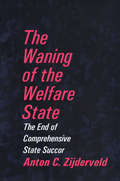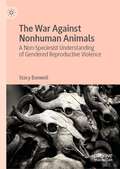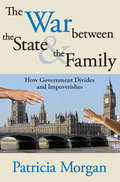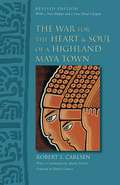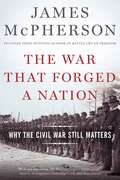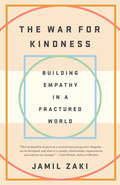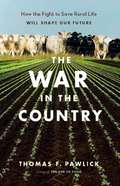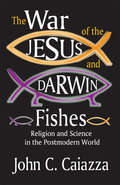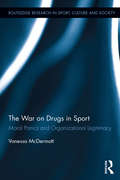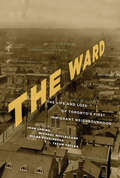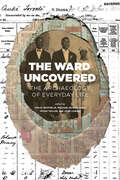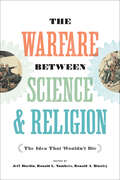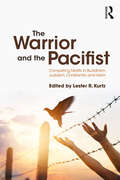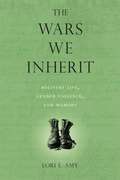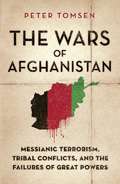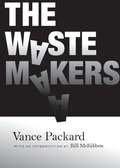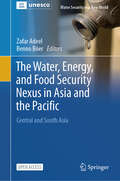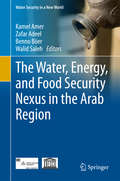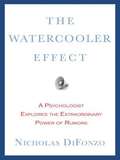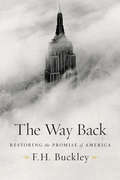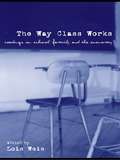- Table View
- List View
The Waning of the Welfare State
by Anton ZijderveldThe welfare state in postwar Western Europe has been extended and intensified in a spectacular manner. Today, "welfare" represents a complex mix of services covering health, education, welfare, the arts, leisure, and social security. Anton C. Zijderveld is of the opinion that Europe's vast, comprehensive welfare state is becoming leaner and meaner, heading down a more sober path toward decentralization and deregulation, which only, but not merely, secures order for its citizens and shields society's vulnerable. As the millennium approaches, Zijderveld believes Europe is experiencing a cultural renaissance and a socioeconomic and political reformation in which the market will flourish and civil society will prosper.The Waning of the Welfare State focuses on the transformation of the welfare state in Europe over a four-decade period. Zijderveld employs the democratic triangle theoretical model, in which democracy is viewed as a system in which state, market, and civil society are held in precious balance. If one component supersedes the other two, democracy is endangered. In its 1960s and 1970s heyday, the state took center stage at the expense of the market and civil society; social democracy was the prevailing ideology. In the 1980s the market triumphed, often at the expense of both the state and civil society; this was the decade of liberalism. Today, civil society prevails, albeit at risk of being injurious to state and market. Ideologically, this is the decade of conservatism.Zijderveld sees a future "Americanization" of European social policy producing a fortuitously balanced coalition of social democracy, liberalism, and conservatism; a place where safety and order, prosperity and economic participation, and social participation and meaningful interactions flourish equally. This transformation carries many risks. But it will, in the end, strengthen Europe's political, economic, and sociocultural stamina. If it also draws the Atlantic partners closer together, as Zijderveld believes it does, the chances of another European communist, libertarian, or fascist Gtterdommerung will remain remote. Zijderveld presents useful concepts in a highly organized fashion. He has produced a very important book for American readers who will, hopefully, discover, beyond the often vast differences, some basic similarities of structures and developments within the European welfare state.
The War Against Nonhuman Animals: A Non-Speciesist Understanding of Gendered Reproductive Violence
by Stacy BanwellWe are currently engaged in an existential species war against nonhuman animals. This book argues that, during this war, nonhuman animals should be granted legal personhood and treated as ‘protected persons’ rather than the property of ‘protected persons.’ The main argument is that War Crimes and Crimes against Humanity – rape, forced pregnancy and other acts of sexual violence – are being committed within the meat, egg and dairy industries. Avoiding ‘dreaded comparisons’, the book explores shared sources of oppression between human and nonhuman animals who are subject to the expressions and consequences of reproductive violence. It asks: what drives and facilitates the war against nonhuman animals? And what are the global consequences of this war? Throughout, it demonstrates how racism, sexism, and speciesism informs both intrahuman violence and the violence(s) of the animal-industrial complex. Ultimately the book asks us to reconsider what it means to be human.
The War Against Parents
by Cornel West Sylvia Ann HewlettSylvia Ann Hewlett and Cornel West, a white woman and a black man, join to address the burning social issue of our time: the virtual abandonment of parents-poor and middle class-by America's business, political, and cultural elites. In what is both a visionary and intimate book, Hewlett and West present a blueprint for parent empowerment, which they call the Parents' Bill of Rights for the 21st century, which gives new value and dignity to the parental role and restores America's commitment to the well-being of children. With candor and hope for the future, the authors seek to unite America's 62 million parents behind an agenda that spans the divides of race, gender, and class.
The War Between the State and the Family: How Government Divides and Impoverishes
by Patricia MorganPatricia Morgan's core assumption is that the family is an extremely effective vehicle for raising the welfare of its members. If this is correct it is quite possible that the state can best support the family by doing very little--by not taxing the family heavily and by minimizing the subsidization of those who choose alternatives to financially self-sustaining family life.At one level, Morgan argues, the family can be seen as a unit within which there occurs enormous transfer of economic resources between husband and wife, parents and children, and, on a wider scale, within extended families. The family is the most important vehicle of welfare and the welfare vehicle of first resort. Within the family many services are provided by family members to each other, rarely for direct personal benefit. Basic economic analysis, Morgan asserts, suggests that the family could be seriously undermined if the state provided significant support for dependents who are not brought up within self-sustaining family units, and if it also provided services, such as childcare, that are generally provided within families. This work shows that this is precisely what has happened in the last twenty-five years.The driving force of significantly reduced family formation is not economic but social. Perhaps social changes have led to a desire by individuals to bring up children in family circumstances different from those of a generation or two ago, but evidence does not support this hypothesis. Rather, tax and benefit systems seem to be important determinants of family structure worldwide. Patricia Morgan does not simply analyze the problem, she also suggests policy solutions. The author argues that divorce laws should be reformed to ensure that those who make commitments are held financially responsible. The author's argument is compelling because it is backed up with strong evidence and is argued from an unemotional economic perspective--individuals within families are rational agents who respond to incentives.
The War For The the Heart & Soul of Highland Maya Town
by Robert S. CarlsenAfter a decade of military occupation known as la violencia, the Tz'utujil-speaking Maya of Santiago Atitlan stood up to the Guatemalan Army in 1990 and forced it to leave their town. Yet that act of solidarity did not close the widening internal divisions that threaten to destabilize the community from within. Ironically, after 500 years of resistance to physical and spiritual conquest, many Atitecos now seem eager to abandon traditional Mayan culture. In this compelling ethnography, Robert S. Carlsen explores the issue of cultural continuity and change as it has unfolded in this representative Mayan community. Drawing on documentary evidence, he argues that local Mayan culture survived the Spanish Conquest remarkably intact and continues to play a defining role in the religious and social life of the community. At the same time, however, he shows how the twentieth-century consolidation of the Guatemalan state has steadily eroded the capacity of Mayan communities to adapt to change and has caused some local factions to reject--even demonize--their own culture.
The War That Forged A Nation: Why The Civil War Still Matters
by James M. McPhersonMore than 140 years ago, Mark Twain observed that the Civil War had "uprooted institutions that were centuries old, changed the politics of a people, transformed the social life of half the country, and wrought so profoundly upon the entire national character that the influence cannot be measured short of two or three generations." In fact, five generations have passed, and Americans are still trying to measure the influence of the immense fratricidal conflict that nearly tore the nation apart. In The War that Forged a Nation, Pulitzer Prize-winning historian James M. McPherson considers why the Civil War remains so deeply embedded in our national psyche and identity. The drama and tragedy of the war, from its scope and size--an estimated death toll of 750,000, far more than the rest of the country's wars combined--to the nearly mythical individuals involved--Abraham Lincoln, Robert E. Lee, Stonewall Jackson--help explain why the Civil War remains a topic of interest. But the legacy of the war extends far beyond historical interest or scholarly attention. Here, McPherson draws upon his work over the past fifty years to illuminate the war's continuing resonance across many dimensions of American life. Touching upon themes that include the war's causes and consequences; the naval war; slavery and its abolition; and Lincoln as commander in chief, McPherson ultimately proves the impossibility of understanding the issues of our own time unless we first understand their roots in the era of the Civil War. From racial inequality and conflict between the North and South to questions of state sovereignty or the role of government in social change--these issues, McPherson shows, are as salient and controversial today as they were in the 1860s. Thoughtful, provocative, and authoritative, The War that Forged a Nation looks anew at the reasons America's civil war has remained a subject of intense interest for the past century and a half, affirms the enduring relevance of the conflict for America today.
The War for Kindness: Building Empathy in a Fractured World
by Jamil Zaki&“In this masterpiece, Jamil Zaki weaves together the very latest science with stories that will stay in your heart forever.&”—Angela Duckworth, author of GritDon&’t miss Jamil Zaki&’s TED Talk, &“We&’re experiencing an empathy shortage, but we can fix it together,&” online now. Empathy is in short supply. We struggle to understand people who aren&’t like us, but find it easy to hate them. Studies show that we are less caring than we were even thirty years ago. In 2006, Barack Obama said that the United States was suffering from an &“empathy deficit.&” Since then, things seem to have only gotten worse. It doesn&’t have to be this way. In this groundbreaking book, Jamil Zaki shares cutting-edge research, including experiments from his own lab, showing that empathy is not a fixed trait—something we&’re born with or not—but rather a skill that can be strengthened through effort. He also tells the stories of people who embody this new perspective, fighting for kindness in the most difficult of circumstances. We meet a former neo-Nazi who is now helping to extract people from hate groups, ex-prisoners discussing novels with the judge who sentenced them, Washington police officers changing their culture to decrease violence among their ranks, and NICU nurses fine-tuning their empathy so that they don&’t succumb to burnout. Written with clarity and passion, The War for Kindness is an inspiring call to action. The future may depend on whether we accept the challenge.Praise for The War for Kindness&“A wide-ranging practical guide to making the world better.&”—NPR&“Relating anecdotes and test cases from his fellow researchers, news events and the imaginary world of literature and entertainment, Zaki makes a vital case for &‘fighting for kindness.&’ . . . If he&’s right—and after reading The War for Kindness, you&’ll probably think so—Zaki&’s work is right on time.&” —San Francisco Chronicle&“In this landmark book, Jamil Zaki gives us a revolutionary perspective on empathy: Empathy can be developed, and, when it is, people, relationships, organizations, and cultures are changed.&”—Carol Dweck, author of Mindset
The War in the Country
by Thomas F. PawlickRural life in North America has changed dramatically since the days of the family farm, when people worked the same land for generations, let their cows graze in pastures and their chickens scratch in dirt, and sold their produce locally. The few remaining small farmers now struggle to survive, strangled by debt and a rash of complex regulations designed to drive them out of business. In their place are corporate-backed factory farms with little understanding of, or sympathy for, rural life. But the corporate and political interests determined to make this life extinct are meeting with fierce resistance. In this passionate and persuasive book, writer and farmer Thomas Pawlick uses his own rural community as a microcosm for the battle between industrial agriculture and local farming - a clash whose outcome will determine the future of rural life in North America - and also the quality and sustainability of our food, water, soil, and air.
The War of the Jesus and Darwin Fishes: Religion and Science in the Postmodern World
by John C. CaiazzaThis volume's title stems from an observable and seemingly amusing phenomenon--the placement of fish symbols on the rear of automobiles. There are two kinds: one a fish outline with a cross, exhibited by Christians; the other a fish outline filled with the word "evolution," with little legs attached underneath. These symbols manifest the cultural war between religion and science, a clash that draws from nineteenth-century conflicts over evolution roots in the Enlightenment.Today's cultural environment is a result of the internationalization of communication, labor, money, and commerce. This global culture emphasizes tolerance and acceptance of all peoples and traditions, but it also demands a moral and intellectual relativism that rejects "master narratives," including religious tradition as well as scientific theory. In some respects, the postmodern environment is caused by science itself, by the development of postmodern science, its nineteenth-century adversarial stance toward religion now somewhat softened. Among new developments are the historical understanding of science, renewed appreciation of the troubled careers of scientists, and "God" talk among physicists and psychologists. Both science and religion are being overwhelmed by new levels of technology, which is becoming the premier element of contemporary culture.The conflict between science and religion is being resolved in the form of a dynamic. Religion and science are both ways of giving moral and intellectual order to the universe, enabling mankind to cope with a chaotic universe and live well. Both religious critics and scientific researchers have attacked and analyzed pornography, which has become a prominent characteristic of our culture. Both share contemporary sensitivity to individual opinions and protection of the individual from social control. Both science and religion share a sense that postmodern culture lacks structure. Caiazza shows how renewed attention to religious and scientific insights can resolve longstanding conflicts, providing postmodern society with a vision of tolerable order.
The War of the Sexes: How Conflict and Cooperation Have Shaped Men and Women from Prehistory to the Present
by Paul SeabrightHow our stone-age brains made modern society, and why it matters for relationships between men and womenAs countless love songs, movies, and self-help books attest, men and women have long sought different things. The result? Seemingly inevitable conflict. Yet we belong to the most cooperative species on the planet. Isn't there a way we can use this capacity to achieve greater harmony and equality between the sexes? In The War of the Sexes, Paul Seabright argues that there is—but first we must understand how the tension between conflict and cooperation developed in our remote evolutionary past, how it shaped the modern world, and how it still holds us back, both at home and at work.Drawing on biology, sociology, anthropology, and economics, Seabright shows that conflict between the sexes is, paradoxically, the product of cooperation. The evolutionary niche—the long dependent childhood—carved out by our ancestors requires the highest level of cooperative talent. But it also gives couples more to fight about. Men and women became experts at influencing one another to achieve their cooperative ends, but also became trapped in strategies of manipulation and deception in pursuit of sex and partnership. In early societies, economic conditions moved the balance of power in favor of men, as they cornered scarce resources for use in the sexual bargain. Today, conditions have changed beyond recognition, yet inequalities between men and women persist, as the brains, talents, and preferences we inherited from our ancestors struggle to deal with the unpredictable forces unleashed by the modern information economy.Men and women today have an unprecedented opportunity to achieve equal power and respect. But we need to understand the mixed inheritance of conflict and cooperation left to us by our primate ancestors if we are finally to escape their legacy.
The War on Drugs in Sport: Moral Panics and Organizational Legitimacy (Routledge Research in Sport, Culture and Society)
by Vanessa McDermottThis book is an innovative and compelling work that develops a modified moral panic model illustrated by the drugs in sport debate. Drawing on Max Weber’s work on moral authority and legitimacy, McDermott argues that doping scandals create a crisis of legitimacy for sport governing bodies and other elite groups. This crisis leads to a moral panic, where the issue at stake for elite groups is perceptions of their organizational legitimacy. The book highlights the role of the media as a site where claims to legitimacy are made, and contested, contributing to the social construction of a moral panic. The book explores the way regulatory responses, in this case anti-doping policies in sport, reflect the interests of elite groups and the impact of those responses on individuals, or "folk devils." The War on Drugs in Sport makes a key contribution to moral panic theory by adapting Goode and Ben-Yehuda’s moral panic model to capture the diversity of interests and complex relationships between elite groups. The difference between this book and others in the field is its application of a new theoretical perspective, supported by well-researched empirical evidence.
The Ward
by Michael Mcclelland John Lorinc Ellen Scheinberg Tatum TaylorFrom the 1870s to the 1950s, waves of immigrants to Toronto - Irish, Jewish, Chinese and Italian, among others - landed in 'The Ward' in the centre of downtown. Deemed a slum, the area was crammed with derelict housing and 'ethnic' businesses; it was razed in the 1950s to make way for a grand civic plaza and modern city hall. Archival photos and contributions from a wide variety of voices finally tell the story of this complex neighbourhood and the lessons it offers about immigration and poverty in big cities. Contributors include historians, politicians, architects and descendents of Ward residents on subjects such as playgrounds, tuberculosis, bootlegging and Chinese laundries.With essays by Howard Akler, Denise Balkissoon, Steve Bulger, Jim Burant, Arlene Chan, Alina Chatterjee, Cathy Crowe, Richard Dennis, Ruth Frager, Richard Harris, Gaetan Heroux, Edward Keenan, Bruce Kidd, Mark Kingwell, Jack Lipinsky, John Lorinc, Shawn Micallef, Howard Moscoe, Laurie Monsebraaten, Terry Murray, Ratna Omidvar, Stephen Otto, Vincenzo Pietropaolo, Michael Posner, Michael Redhill, Victor Russell, Ellen Scheinberg, Sandra Shaul, Myer Siemiatycki, Mariana Valverde, Thelma Wheatley, Kristyn Wong-Tam and Paul Yee, among others.
The Ward
by Michael Mcclelland John Lorinc Ellen Scheinberg Tatum TaylorThe story of the growth and destruction of Toronto's first 'priority neighbourhood.' From the 1840s until the Second World War, waves of newcomers who migrated to Toronto - Irish, Jewish, Italian, African American and Chinese, among others - landed in 'The Ward.' Crammed with rundown housing and immigrant-owned businesses, this area, bordered by College and Queen, University and Yonge streets, was home to bootleggers, Chinese bachelors, workers from the nearby Eaton's garment factories and hard-working peddlers. But the City considered it a slum, and bulldozed the area in the late 1950s to make way for a new civic square. The Ward finally tells the diverse stories of this extraordinary and resilient neighbourhood through archival photos and contributions from a wide array of voices, including historians, politicians, architects, storytellers, journalists and descendants of Ward residents. Their perspectives on playgrounds, tuberculosis, sex workers, newsies and even bathing bring The Ward to life and, in the process, raise important questions about how contemporary cities handle immigration, poverty and the geography of difference. Contents & Contributors Introduction - John Lorinc Searching for the Old Ward - Shawn Micallef No Place Like Home - Howard Akler Before the Ward: Macauleytown - Stephen A. Otto My Grandmother the Bootlegger - Howard Moscoe Against All Odds: The Chinese Laundry - Arlene Chan VJ Day - Arlene Chan Merle Foster's Studio: 'A Spot Of Enchantment' - Terry Murray Missionary Work: The Fight for Jewish Souls - Ellen Scheinberg King of the Ward - Myer Siemiatycki Where the Rich Went for Vice - Michael Redhill A Fresh Start: Black Toronto in the 19th Century - Karolyn Smardz Frost Policing the Lord's Day - Mariana Valverde 'The Maniac Chinaman' - Edward Keenan Elsie's Story - Patte Roseban Lawren Harris's Ward Period - Jim Burant 'Fool's Paradise': Hastings' Anti-Slum Crusade - John Lorinc Strange Brew: The Underground Economy of Blind Pigs - Ellen Scheinberg The Consulate, the Padroni and the Labourers - Andrea Addario Excerpt: The Italians in Toronto - Emily P. Weaver Arthur Goss: Documenting Hardship - Stephen Bulger Fresh Air: The Fight Against TB - Cathy Crowe The Stone Yard - Gaetan Heroux William James: Toronto's First Photojournalist - Vincenzo Pietropaolo The Avenue Not Taken - Michael McClelland Timothy Eaton's Stern Fortifications - Michael Valpy Settling In: Central Neighbourhood House - Ratna Omidvar and Ranjit Bhaskar Toronto's Girl with the Curls - Ellen Scheinberg Chinese Cafés: Survival and Danger - Ellen Scheinberg and Paul Yee Defiance and Divisions: The Great Eaton's Strike - Ruth A. Frager Elizabeth Street: What the City Directories Reveal - Denise Balkissoon Growing Up on Walton Street - Cynthia MacDougall Revitalizing George Street: The Ward's Lessons - Alina Chatterjee and Derek Ballantyne Taking Care of Business in the Ward - Ellen Scheinberg 'A Magnificent Dome': The Great University Avenue Synagogue - Jack Lipinsky Reading the Ward: The Inevitability of Loss - Kim Storey and James Brown Toronto's First Little Italy - John Lorinc The Elizabeth Street Playground, Revisited - Bruce Kidd Divided Loyalties - Sandra Shaul Crowded by Any Measure - John Lorinc A Peddler and His Cart: The Ward's Rag Trade - Deena Nathanson Toronto's Original Tenement: Wineberg Apartments - Richard Dennis Excerpt: Tom Thomson's Diary - Tom Thomson An Untimely Death - Brian Banks Paper Pushers - Ellen Scheinberg The BMR's Wake-Up Call - Laurie Monsebraaten Excerpt: Report of the Medical Health Officer ... - Charles J. Hastings Dr. Clarke's Clinic - Thelma Wheatley Slum-Free: The Suburban Ideal - Richard Harris The Glionna Clan and Toronto's First Little Italy - John E. Zucchi 'The Hipp' - Michael Posner Before Yorkville - John Lorinc Sex Work and the Ward's Bachelor Society - Elise Chenier Public Baths: Schvitzing on Centre Avenue - Ellen Scheinberg The Health Advocates: McKeown on Hastings - John Lorinc Remembering Toronto's First Chinatown - Kristyn Wong-Tam Tabula Rasa - Mark Kingwell U...
The Ward Uncovered: The Archaeology of Everyday Life
by John Lorinc Tatum Taylor Holly Martelle Michael McClellandIn early 2015, a team of archaeologists began digging test trenches on a non-descript parking lot next to Toronto City Hall -- a site designated to become a major new court house. What they discovered was the rich buried history of an enclave that was part of The Ward -- that dense, poor, but vibrant 'arrival city' that took shape between the 1840s and the 1950s. Home to waves of immigrants and refugees -- Irish, African-Americans, Italians, eastern European Jews, and Chinese -- The Ward was stigmatized for decades by Toronto's politicians and residents, and eventually razed to make way for New City Hall. The archaeologists who excavated the lot, led by co-editor Holly Martelle, discovered almost half a million artifacts -- a spectacular collection of household items, tools, toys, shoes, musical instruments, bottles, industrial objects, food scraps, luxury items, and even a pre-contact Indigenous projectile point. Martelle's team also unearthed the foundations of a nineteenth-century Black church, a Russian synagogue, early-twentieth-century factories, cisterns, privies, wooden drains, and even row houses built by formerly enslaved African Americans. Following on the heels of the immensely popular The Ward: The Life and Loss of Toronto's First Immigrant Neighbourhood, which told the stories of some of the people who lived there, The Ward Uncovered digs up the tales of things, using these well-preserved artifacts to tell a different set of stories about life in this long-forgotten and much-maligned neighbourhood. Contributors include Abbey Flower, Sarah Hood, Ron Williamson, Cheryl Thompson, Peter Popkin, Arlene Chan, Karolyn Smardz Frost, Simon Rogers, Liz Driver, Vid Ingelvics, Bethany Good, Adrienne Chambon, Kathy Grant, Guylaine Petrin, Craig Heron, Tom Porawski, Wayne Reeves, Wenh-In Ng, Ellen Scheinberg, Nicole Brandon, Rosemary Sadlier, Matt Beaudoin, Natasha Henry, and Heather Murray.
The Warfare between Science & Religion: The Idea That Wouldn't Die
by Edited by Jeff Hardin, Ronald L. Numbers, and Ronald A. BinzleyA “very welcome volume” of essays questioning the presumption of irreconcilable conflict between science and religion (British Journal for the History of Science).The “conflict thesis”—the idea that an inevitable, irreconcilable conflict exists between science and religion—has long been part of the popular imagination. The Warfare between Science and Religion assembles a group of distinguished historians who explore the origin of the thesis, its reception, the responses it drew from various faith traditions, and its continued prominence in public discourse.Several essays examine the personal circumstances and theological idiosyncrasies of important intellectuals, including John William Draper and Andrew Dickson White, who through their polemical writings championed the conflict thesis relentlessly. Others consider what the thesis meant to different religious communities, including evangelicals, liberal Protestants, Roman Catholics, Eastern Orthodox Christians, Jews, and Muslims. Finally, essays both historical and sociological explore the place of the conflict thesis in popular culture and intellectual discourse today.Based on original research and written in an accessible style, the essays in The Warfare between Science and Religion take an interdisciplinary approach to question the historical relationship between science and religion, and bring much-needed perspective to an often-bitter controversy.Contributors include: Thomas H. Aechtner, Ronald A. Binzley, John Hedley Brooke, Elaine Howard Ecklund, Noah Efron, John H. Evans, Maurice A. Finocchiaro, Frederick Gregory, Bradley J. Gundlach, Monte Harrell Hampton, Jeff Hardin, Peter Harrison, Bernard Lightman, David N. Livingstone, David Mislin, Efthymios Nicolaidis, Mark A. Noll, Ronald L. Numbers, Lawrence M. Principe, Jon H. Roberts, Christopher P. Scheitle, M. Alper Yalçinkaya
The Warrior and the Pacifist: Competing Motifs in Buddhism, Judaism, Christianity, and Islam
by Lester R. KurtzThis book looks at two contradictory ethical motifs—the warrior and the pacifist—across four major faith traditions—Buddhism, Judaism, Christianity, and Islam—and their role in shaping our understanding of violence and the morality of its use. The Warrior and the Pacifist explores how these faith traditions, which now mutually inhabit our life spaces, bring with them across the millennia the moral teachings that have traveled from prehistoric humanity, embedded in the beliefs, rituals, and institutions socially constructed by humans to deal with ultimate concerns, core aspects of daily personal and social life, and life transitions.
The Wars We Inherit: Military Life, Gender Violence, and Memory
by Lori E. AmyBy combining personal memoir and critical analysis, Lori Amy links the violence we live in our homes to the violence that structures our larger culture. The Wars We Inherit brings insights from memory and trauma studies to the story of violence in the author's own family. In this brave, fascinating and compelling book, Amy concerns herself with the violence associated with the military, and how this institution of public, cultural violence, with its hypermasculinity, pervades society with physical, verbal, emotional and sexual aggression. She uses her war-veteran father to represent the chaotic and dehumanizing impact of war to show how violence is experienced and remembered. Amy provides examples that support the relationship between military structures and domestic violence, or how the sexual violence that permeates her family prompts debates about the nature of trauma and memory. In addition, Amy employs feminist psychoanalytic theory, cultural and trauma studies, and narrative theory, to explain how torture in Abu Ghraib is on a direct continuum with the ordinary violence inherent in our current systems of gender and nation. Placing individual experience in cultural context, Amy argues that "if we can begin, in our own lives, to transform the destructive ways that we have been shaped by violence, then we might begin to transform the cultural conditions that breed violence. "
The Wars of Afghanistan
by Peter TomsenThis revelatory, unprecedented, insiderOCOs account of AfghanistanOCOs history since the 1970s, and of U. S. involvement, is indispensable reading for anyone concerned about the current war"
The Washington Post Pulitzers: Feature Writing, Gene Weingarten
by Gene WeingartenRecipient of the Pulitzer Prize for Feature Writing. What happens when one of the world&’s most renowned musicians appears incognito outside of a Washington, D.C. metro station to play some of the most beautiful music ever composed? In the audacious social experiment, &“Pearls Before Breakfast&”, Gene Weingarten seeks out the answer to this question as he chronicles how an audience of rush hour pedestrians pass indifferently by as international wunderkind Joshua Bell plays his Stradivarius. He also examines a horrifying phenomenon in the remarkable story "Fatal Distraction", in which he speaks to thirteen mothers and fathers whose children died as the result of being left in a sweltering car during the hot summer months. The result is an emotional revelation that inspires readers to take a closer look at the world around them.
The Waste Makers
by Bill Mckibben Vance PackardAn exposé of "the systematic attempt of business to make us wasteful, debt-ridden, permanently discontented individuals," The Waste Makers is Vance Packard's pioneering 1960 work on how the rapid growth of disposable consumer goods was degrading the environmental, financial, and spiritual character of American society. The Waste Makers was the first book to probe the increasing commercialization of American life--the development of consumption for consumption's sake. Packard outlines the ways manufacturers and advertisers persuade consumers to buy things they don't need and didn't know they wanted, including the two-of-a-kind of everything syndrome--"two refrigerators in every home"--and appeals to purchase something because it is more expensive, or because it is painted in a new color. The book also brought attention to the concept of planned obsolescence, in which a "death date" is built into products so that they wear out quickly and need to be replaced. By manipulating the public into mindless consumerism, Packard believed that business was making us "more wasteful, imprudent, and carefree in our consuming habits," which was using up our natural resources at an alarming rate. A prescient book that predicted the rise of American consumer culture, this all new edition of The Waste Makers features an introduction by best-selling author Bill McKibben. Vance Packard (1914-1996) was an American journalist, social critic, and best-selling author. Among his other books were The Hidden Persuaders, about how advertisers use psychological methods to get people to buy the products they sell; The Status Seekers, which describes American social stratification and behavior; and The Naked Society, about the threats to privacy posed by new technologies.
The Water, Energy, and Food Security Nexus in Asia and the Pacific: Central and South Asia (Water Security in a New World)
by Benno Böer Zafar AdeelThis open access book considers that the Central and South Asian region sits at the middle of geographical, geopolitical, economic and historical cross-roads. Since the independence of the Central Asian states in the 1990s, following the demise of the Soviet Union, and emergence of regional trade and political ties means that the region’s evolution has also been subject to common drivers – external and internal, opening up some new opportunities. The long-term social and economic success of the region depends on how water, energy, and food security is achieved at a regional scale that combines Central Asia and South Asia, which are typically treated separately in policy and scholarly works. This book considers how securing the “Nexus” of water, energy, and food resources serves as a starting point for utilizing emerging region-wide opportunities. It does so by identifying the present state of play, deeply analyzing cross-cutting drivers (e.g., climate change, poverty, environmentalcrises and urbanization) and offering insights into possible solutions.The book offers an in-depth rationale for why dealing with this region as a whole makes sense; it is then divided into four sections: The first section, entitled “A Regional Overview,” establishes the basic facts around the state of water, energy, and food resources; this section is meant to serve as the foundation upon which further exploration and analysis is built. The second section turns its attention to “Regional Issues” and unpacks the Nexus into water–energy and water–food relationships. It also investigates how regional trade and coping mechanisms for environmental crises might inform the policies on the Nexus. The section includes a sampling of success and failure stories around implementation of the Nexus policies and strategies in the Central and South Asian region. The third section undertakes an analysis of the “Cross-Cutting Themes for Nexus Security” by investigating all the major drivers of policy and development strategies in the region: climate change, urbanization, poverty, sharing of resources across borders, and gender-based disparities. The fourth and final section uses the discussion throughout the book to formulate “An Integrated Narrative” around the Nexus. It explores how the new global development framework in the form of Sustainable Development Goals might offer a new perspective for achieving the Nexus security in the region. There is an argument that the Nexus security ties in with achievement of long-term peace and security. A final wrap-up chapter gazes into the crystal ball to test out some future scenarios – both positive and negative.
The Water, Energy, and Food Security Nexus in the Arab Region
by Benno Böer Zafar Adeel Kamel Amer Walid SalehThis book investigates the need for a more open and interdisciplinary dialogue on the nexus of food, water and energy security in the Arab region. It argues that achieving sustainable economic development is irretrievably tied to the security of the water-energy-food nexus, which is in turn essential for bringing about sustained peace. Further, it discusses various approaches to achieving these lofty objectives, and offers the following take-away messages: The Arab region is currently under considerable water stress, and the situation will continue to get worse with a number of global changes - most notably those related to climate and regional water distribution. Viable solutions are available in the Arab region and can be implemented through innovative policies, judicious use of new technologies, and stimulating public opinion. Integration across water, energy, and food sectors is obviously needed but achieving it in practice is extremely challenging. There are some gaps in the scientific understanding but at the same time there is a wealth of data and synthesized information that can guide decision-making.
The Watercooler Effect
by Nicholas Difonzo"A fresh look at informal communication, and how information spreads rapidly...An absorbing and compelling book." -Daniel J. Levitin, author of This Is Your Brain on Music and The World in Six Songs "Nicholas DiFonzo is one of the world's experts on why rumors spread. If you've ever wondered where rumors come from or whether some new rumor is true, this book will fascinate you." - Chip Heath, coauthor of Made to Stick: Why Some Ideas Survive and Others Die During the 2008 presidential election, both campaigns sought to detect, decipher, and defuse a host of derogatory rumors. After Hurricane Katrina, rumors swirled about stranded residents shooting rescue workers. Tipping off the economic crisis, costly rumors crippled financial institutions as they flew through the stock market. Pyschologist Nicholas DiFonzo has studied hearsay for more than fifteen years, and in this book he shows how the process that gave rise to these troubling rumors is fundamentally the same as a tête-à-tête around the company watercooler. With The Watercooler Effect, you'll learn: * how businesses or campaigns can control destructive rumors * how to sort fact from fiction * why a "no comment" response can be more detrimental than helpful * how an organization can increase trust from within * why rumors can actually become more truthful the more they spread DiFonzo argues that rumors stem from our deeply rooted motivation to make sense of the world and are a window into both individual and group psychology. Using fascinating case studies and surprising research findings, The Watercooler Effect gives you the tools to find the truth behind the rumor.
The Way Back: Restoring the Promise of America
by F. H. BuckleyThe promise of America is that, with ambition and hard work, anyone can rise to the top. But now the promise has been broken, and we've become an aristocracy where rich parents raise rich kids and poor parents raise poor kids.We've been told that the changes are structural, that there's nothing we can do about this. But that doesn't explain why other First World countries are beating us hands down on the issue of mobility.What's different about America is our politics. An ostensibly progressive New Class of comfortably rich professionals, media leaders, and academics has shaped the contours of American politics and given us a country of fixed economic classes. It is supported by the poorest of Americans, who have little chance to rise, an alliance of both ends against the middle that recalls the Red Tories of parliamentary countries. Because they support an aristocracy, the members of the New Class are Tories, and because of their feigned concern for the poor, they are Red Tories.The Way Back explains the revolution in American politics, where political insurgents have challenged the complacent establishment of both parties, and shows how we can restore the promise of economic mobility and equality by pursuing socialist ends through capitalist means.
The Way Class Works: Readings on School, Family, and the Economy
by Lois WeisSince the 1980s, the relationship between social class and education has been overshadowed by scholarship more generally targeting issues of race, gender, and representation. Today, with the global economy deeply immersed in social inequalities, there is pressing need for serious class-based analyses of schooling, family life and social structure. The Way Class Works is a collection of twenty-four groundbreaking essays on the material conditions of social class and the ways in which class is produced "on the ground" in educational institutions and families. Written by the most visible and important scholars in education and the social sciences, these timely essays explore the production of class in and through the economy, family, and school, while simultaneously interrogating and challenging our understandings of social class as linked to race, gender, and nation. With essays by distinguished scholars and questions for further reflection and discussion, The Way Class Works will be an invaluable resource for students and scholars in education, sociology, and beyond.
